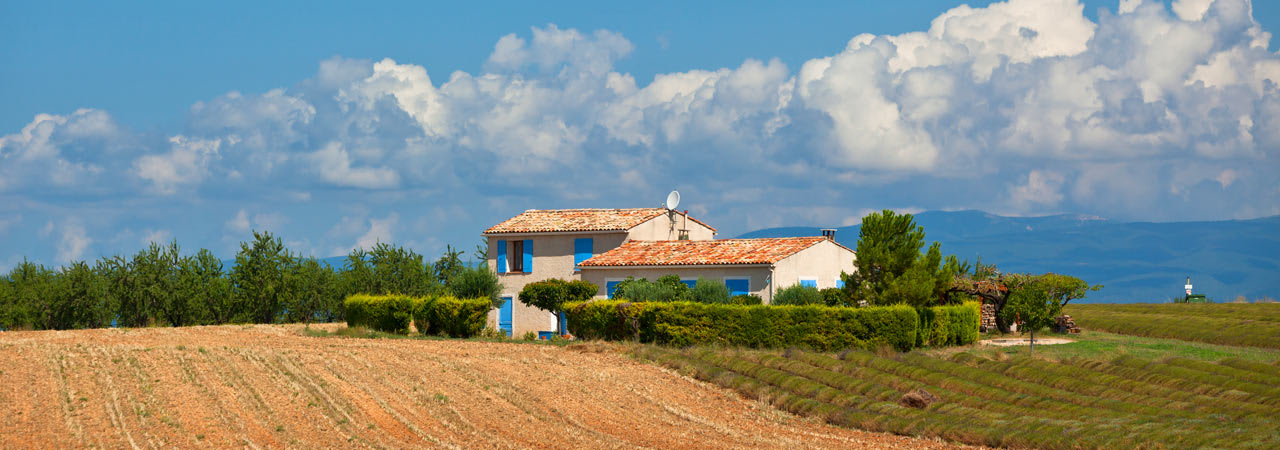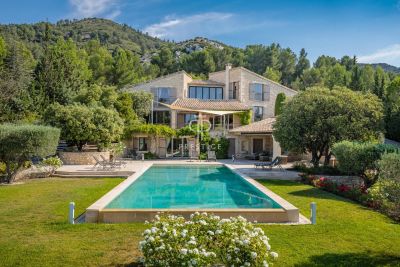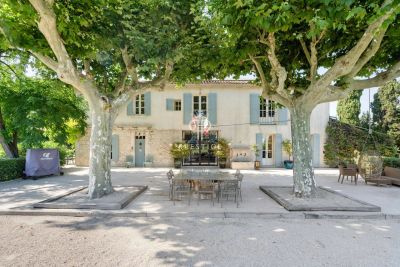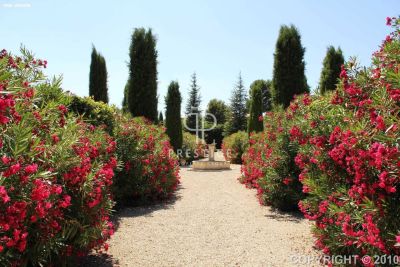Welcome in a new day with a gentle early morning swim in your own private swimming pool before enjoying a leisurely ‘al fresco’ breakfast and drinking in the wonderful rural views surrounding your restored stone mas; while away a sunny day basking in the sun on the patio and then take a stroll through the ancient olive groves and listen to the gentle murmur of a distant stream; relax with family and friends around an evening barbecue and watch the sun set behind distant mountains. Mostly located in quietly beautiful rural locations in the countryside of southern France and beautifully renovated to offer fabulous living space, there are mas for sale throughout Languedoc Roussillon and Provence – particularly in the Camargue and Luberon – all presenting an ideal investment opportunity for investors wanting something that little bit different.
What is a Mas?
A mas is a traditional farmhouse - originally a farm producing fruit, vegetables, grain, milk, meat and even silkworms – made of local stone and built so that the property always faces away from the direction of the wind. The rear of the building is windowless and the sides of the property have very small and narrow windows to protect against the heat of the summer or the cold of the winter. A mas in Provence is almost always rectangular, with two sloping roofs, although those in Luberon can also be L shaped. A stairway, often in the centre, leads to a corridor on the upper floor, usually on the north side of the house, which opens onto the bedrooms. The upper floor also has space for storing forage for the animals and grain, and for the raising of silkworms. The mas of the Camargue is strongly influenced by the climate and the environment, and resembles a Spanish hacienda, with large spaces, white walls, an interior court and buildings in the form of a U for the residence and stables. The size of a mas depended upon the wealth and number of its original occupants: from 150 square metres to over one thousand square metres, including the barn and other structures. As the family grew larger the mas would be made longer to accommodate them.
The traditional mas is now a very sought-after type of property both as a second home and for holiday rentals, and across the south of France there is a healthy supply of mas for sale in a range of sizes and locations. The larger properties – those with five bedrooms or more - offer excellent opportunities for holiday rental income with some having been converted into individual apartments or operating as a ‘bed and breakfast’.
The region of Provence ranges from the snow-capped mountains of the Southern Alps to the delta plains of the Camargue, and boasts Europe’s greatest canyon, the Gorges du Verdon. Historic fortified towns guard its ancient borders, picturesque villages perch defensively on hilltops and the great cities of Arles, Aix and Avignon are full of gastronomic delights, historic wonders and cultural glories. Mas for sale in Provence can be found throughout the region for a wide range of prices depending on the size and location.
Restored Mas for sale
All will have been restored to a very high standard using traditional materials such as wood and stone and retaining the original stone walls and high vaulted ceilings but including modern amenities such as swimming pools, large terraces with superb views and luxury accommodation including fully fitted kitchens, modern en suite bathrooms and beautifully decorated interiors. Mas for sale in Provence are found in some of the most beautiful locations in the region; surrounded by green and shady pine forests, clinging to the sides of rugged mountains or overlooking wooded valleys or wide gleaming rivers. Always facing south to protect from the mistral winds, these mas have the most wonderful views and provide an ideal location to simply relax, soak up the sunshine and enjoy the peace and tranquillity of rural France. Prices range from around €500,000 to over €1.5m for the larger properties with more land.
Buying a Mas in France
Bordering Provence, Languedoc Roussillon is an undiscovered gem of a region ranging from the breathtakingly beautiful Mediterranean coastline to the rugged snow-capped mountains of the Pyrenees. It has some of France's best cuisine, a rich medieval history and historic cities such as Carcassonne, Narbonne and Nîmes. Mas for sale in Languedoc Roussillon again vary enormously depending on your budget and taste but typically can be found dotted throughout the rural landscape in picturesque and tranquil locations. Although the region is typically cheaper than neighbouring Provence, the continuing healthy demand for top quality mas have kept prices relatively high. For example an 18th Century mas near the walled city of Carcassonne with four bedrooms, swimming pool and an outside dining area and surrounded by ancient woodland and orchards would cost in the region of €700,000 which is comparable to Provence although there are cheaper properties also available for around €200,000 - €350,000 although these are typically smaller with less land.
Mas are special; evoking the traditions and romance of a bygone era yet providing all the convenience and luxury of modern day living, they are becoming increasingly popular as an investment both as a residence and also as holiday rental accommodation. There are mas for sale in some of the most stunning and remote areas of France and for the wise investor, these unusual properties can provide an excellent investment opportunity.
1. Signing the Agreement (Compris)
On finding a property you wish to purchase you will need to negotiate the terms, price and conditions of the sale with the owner.
The next step, once you are in agreement, is to sign the preliminary contract (Compromis de Vente). This is a legal document and after ten days will be binding on both parties. Rules change frequently in France and it is best to consult with your notary about when this period starts. Generally the compris will be signed in France with the Agent.
Variants can be included in the compris, for example an Acte (clause) can be added if the name or names to go on the title deed have not been finalised. If a mortgage will be required to purchase the property, the details for this, including the name of the mortgage company, must be on the compris.
2. Paying the Deposit
Generally the deposit will be 10% of the agreed purchase price. This will normally be paid to the notaire. There are exceptions to this, if the agent holds a carte professionelle, is bonded and fully registered then you may pay them, but do not hand over the deposit to anyone else. If for some reason the purchase does not go through, for example, if you write to the notaire and the agent that you do not wish to go continue with the purchase before the contract is binding (within seven days of signing the compris), then your deposit would be repaid. This would also apply if a condition had not been met, or the mayor or S.A.F.E.R. (a government agency that has the right of first purchase on most rural property that comes onto the market in France) could oblige the purchaser to give way. If you decide after the seven days 'cooling off' period that you do not wish to complete the purchase and pull out of the sale you would lose your deposit. If however the vendor pulls out of the sale then you will receive your deposit back plus the same amount from the vendor.
3. On Completion
Generally it will take around two or three months to complete the purchase.
During this time the balance of the purchase money must be paid into the account of the notaire, this must be done well ahead of the completion date. The notaire will prepare the documents, check that the deed of sale (Acte de Vente) is in order and have the legal title ready to be signed over. It is possible to have someone sign on your behalf if you give them power of attorney. An interpreter may be of use at this point if your French is not very good and many Notaires will suggest (or insist) that an interpreter is with you.
IMPORTANT - Disclaimer :
All information provided is believed to be current and provided free of charge. No liability can be accepted for the reliability of the information and statements made as this is obtained from 3rd parties. We always recommend you take legal advice from a fully qualified Lawyer or Notary before buying a property overseas.
Close










 Facebook
Facebook Twitter
Twitter Instagram
Instagram